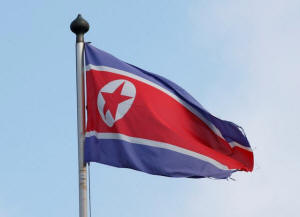|
Japan detects radio signals pointing to
possible North Korea missile test: source
 Send a link to a friend
Send a link to a friend
 [November 28, 2017]
TOKYO/ [November 28, 2017]
TOKYO/
WASHINGTON (Reuters) - Japan
has detected radio signals suggesting North Korea may be preparing
another ballistic missile launch, although such signals are not unusual
and satellite images did not show fresh activity, a Japanese government
source said on Tuesday.
After firing missiles at a pace of about two or three a month since
April, North Korean missile launches paused in September, after it fired
a rocket that passed over Japanís northern Hokkaido island.
"This is not enough to determine (if a launch is likely soon)," the
source told Reuters.
Japan's Kyodo news agency reported late on Monday that the Japanese
government was on alert after catching such radio signals, suggesting a
launch could come in a few days. The report also said the signals might
be related to winter military training by the North Korean military.
North Korea is pursuing its nuclear weapons and missile programmes in
defiance of U.N. Security Council sanctions and has made no secret of
its plans to develop a missile capable of hitting the U.S. mainland. It
has fired two missiles over Japan.

South Korea's Yonhap news agency, citing a South Korean government
source, also reported that intelligence officials of the United States,
South Korea and Japan had recently detected signs of a possible missile
launch and have been on higher alert.
South Korean Unification Minister Cho Myoung-gyon told reporters on
Tuesday there have been "noteworthy" movements from the North since its
last missile launch in mid-September, but there was no hard evidence of
another nuclear or missile test.
"North Korea hasn't been engaging in new nuclear or missile tests but
recently we've seen them persistently testing engines and carrying out
fuel tests," said Cho at a media event in Seoul.
"But we need some more time to see whether these are directly related to
missile and nuclear tests."
Asked about the media reports, Pentagon spokesman Colonel Robert Manning
told reporters the United States continued to watch North Korea very
closely.
[to top of second column] |

A flag is pictured outside the Permanent Mission of North Korea in
Geneva, Switzerland, November 17, 2017. REUTERS/Denis Balibouse

"This is a diplomatically led effort at this point, supported by
military options," he said.
"The Republic of Korea and U.S. alliance remains strong and capable
of countering any North Korean provocations or attacks."
Two U.S. government sources familiar with official assessments of
North Korean capabilities and activities said that while they were
not immediately familiar with recent intelligence suggesting that
North Korea was preparing to launch a new missile test, the U.S.
government would not be surprised if such a test were to take place
in the very near future.
Other U.S. intelligence officials noted North Korea has previously
sent deliberately misleading signs of preparations for missile and
nuclear tests, in part to mask real preparations, and in part to
test U.S. and allied intelligence on its activities.
South Korea's Cho said North Korea may announce the completion of
its nuclear programme within a year, as it is moving more faster
than expected in developing its arsenal.
North Korea defends its weapons programmes as a necessary defence
against U.S. plans to invade. The United States, which stations
28,500 troops in South Korea, a legacy of the 1950-53 Korean war,
denies any such intention.
(Reporting by Nobuhiro Kubo in TOKYO, Phil Stewart, Mark Hosenball
and John Walcott in WASHINGTON, Soyoung Kim and Christine Kim in
SEOUL; Writing by Linda Sieg; Editing by lincoln Feast and Nick
Macfie)
[© 2017 Thomson Reuters. All rights
reserved.]
Copyright 2017 Reuters. All rights reserved. This material may not be published,
broadcast, rewritten or redistributed.
 |